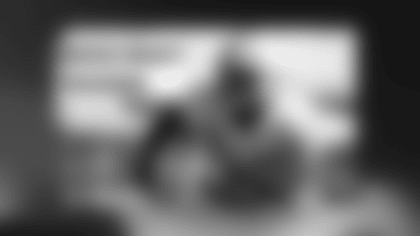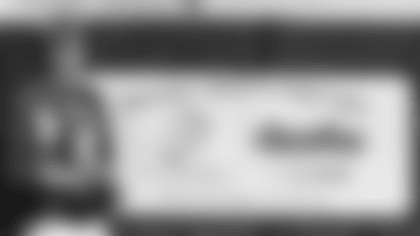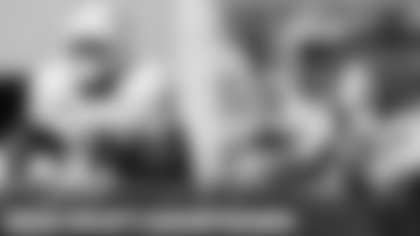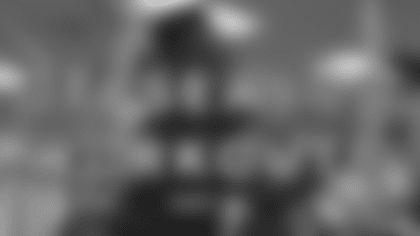DIRECTOR OF PLAYER PERSONNEL NICK CASERIO
NC: Everybody's wide awake. I appreciate everyone sticking around. Hopefully it was a productive evening for us. First off, tip of the hat to Monti Ossenfort and the college staff. There's a lot of time, there's a lot of labor and a lot of effort from a line of people. Monti [is] certainly at the forefront of that. There's a lot of people who put a lot of effort in this process. It's a long process. It's a laborious process. There's a lot that goes into it. There's a lot of information that we need to gather and sort through, so credit to Monti and his staff for the job that they do. He's an immense help to Bill [Belichick] and I both. We're lucky to have him. It was an interesting night. We were in the position there where we had two picks there in the first round. First pick, we picked Isaiah [Wynn]. First off, both players they come from a great program. We have a lot respect, a tremendous amount of respect for [Georgia] coach [Kirby] Smart and the job he does and he's doing at Georgia and the job he did at Alabama. Both these players are playing against some of the best players in the country on a weekly basis and they were productive players. Isaiah has a lot of experience. He started for three years. He's played both guard and tackle, he's played multiple spots. He's been productive in both of those areas, so he's a good player, he's got good traits, he's been in a good program. He had to block a lot of good people in that conference, as you all know, you guys who all watch SEC football know there's a lot of good football players down there, a lot of them got drafted tonight, there's a probably a bunch that get drafted tomorrow, so he's had to block those players. He has experience playing multiple spots so we'll put him in the mix and see how it goes. Our whole philosophy on the whole offensive line is that we'll put the best five guys out there and however it sorts itself out, it'll sort itself out. So that was the pick there. And then the second pick there at No. 31 with Sony Michel - they're backfield with he and [Nick] Chubb, you're talking about two of the most productive players in the SEC. Sony averaged six, seven yards a carry over the course of his career. He's an athletic player. Both of those guys, they've got a bunch of carries. Sony was productive in the passing game so both these guys are good football players and have good football traits. We hope they fit our program. The expectation is that these guys come in here, they work hard and they do what they're asked to do - nothing more, nothing less. That's the most important thing. All these players, regardless of when they're picked and who they are, they have a long, long, long way to go. It doesn't matter what round they're picked in. When you're talking about the draft, essentially you're talking about developmental players. It doesn't really matter where they're picked. These players a got long way to go. If you look through the history of the league and the first round and go on down, these guys have a long way to go, a lot of work to do. They're behind our players. I mean, our players have been in the off-season program here for a couple of weeks. We're going into phase two, so whoever comes into this building has a long way to go. They're behind so the most important thing for them to do is come in, work hard and assimilate to our program and do what they're asked to do. That's the expectation for them from day one.
Q: What allowed you to take a tackle that's less than six-foot-three which is not usually ideal for that position? What did you see that allowed him to have success there?
NC: Just watch him play, he was a good pass blocker, he blocked a lot of good people. They play some good teams, and he was effective doing that. The guy has experience playing multiple spots. He played tackle this year, left tackle and then played guard for two years. He has experience playing multiple spots so in the end we'll do what we think is best for the team.
Q: You generally don't take running backs very high. What makes Sony Michel exceptional in that you decided to take him that high?
NC: Look, our responsibility is just to pick good football players. That's the most important thing. We think he's a good football player so we picked the player. He's got pretty good skills. He's athletic. He's good in space. He's a strong runner for his size, 210-215 pounds, whatever he is. Our thing is to pick good football players who have good traits. However they get here, they get here. He gets the same opportunity when he gets here, so regardless of where they're picked. We liked the player so we went ahead and picked him.
Q: You guys have been able to generate guys from different spots who aren't necessarily high draft picks.
NC: There's no template in terms of how you put it together. Our thing each year is to pick good players and try to get as many good football players on our team as possible. That's what we try to do.
Q: With the 23rd and 31st picks, was there much effort to move around the draft board?
NC: There's always discussion. In the end, we ended up picking where we did. It's player-driven, other teams' interest, it's based on other players. Look, we listen to everything. Sometimes there's discussions, sometimes there's not. The way it kind of sorted itself out this evening, we wound up picking at both spots. That's just the way it went here.
Q: There was a lot of buzz about you guys having interest in [QB] Lamar Jackson. Did you consider him carefully with either of these picks?
NC: There's a lot of things that we talked about. Our process is pretty thorough. We spend a lot of time on a lot of different players. There's a lot players we talked about so we picked a couple of players tonight. We have an opportunity in the second round to pick another two players if we stay and pick or if we have some opportunities to potentially move some things around. There's a lot of discussion about a lot of players. We can only pick so many. In this case, we can only pick two. Sometimes, you can only pick one. We talk about a lot of guys on a pretty regular basis. It's pretty fluid. In the end, we just try to pick the players we feel our best for us.
Q: Did it surprise you that Tennessee traded right before you?
NC: Not necessarily. Once you get to a certain point, teams are moving around. It's very player-driven, very player-specific so I wouldn't say there's really any surprises. Obviously the underclassmen are a huge part of it like they always are. The quarterbacks were a huge part of it, however many went in the first five picks. I wouldn't say there was anything that different or that surprising about what happened in the first round.
Q: When Tennessee made the trade, did you think, they're trying to get ahead of us?
NC: No. With all due respect, that wasn't the response. Jon [Robinson] and Mike [Vrabel] do what they thought was best for their team. We didn't throw our pens against the wall and go, 'Oh my gosh, what just happened?'. We were just ready to move on to the next pick.
Q: You said, when it comes to the offensive line, you want to get your best five out there. With Isaiah, do you feel he has the requisite athleticism to play tackle?
NC: We'll see how it goes. When they get here, we'll put them out there, we'll get them reps. In the end, it'll come back to what we think is best for the team. It's like when we drafted Nate [Solder]. His first year, the guy played right tackle and the guy never played right tackle before in his life. He was a jumbo tight end. However it goes, it's so early in the process. We haven't even been on the field yet with the group that we have. And there's probably going to be some other moving parts here, so we'll work him wherever we think is best and see how it unfolds. In the end, we just try the best five out there in the best sports that we feel is best for our offense and for our team.
Q: How much concern was Sony Michel's bone-on-bone condition for his knee?
NC: Yeah, we take a lot of information. There's a lot of information that we sort through so in the end whatever you have with the player you take everything that comes along with it. So you're either comfortable or you're not comfortable with a player's situation. So you take a lot of that information in. So in the end we felt we were comfortable with the player so we went ahead and made the pick.
*Q: Since you've had a look at Tony Garcia since he's been back for workouts, do you have a feeling now whether or not he'll be competitive come training camp and OTAs? *
NC: Yeah, I think we've got, still Greg [Bedard], we've got a long way to go here. I mean like I said, the guys have been here a couple weeks. So I mean they've been in the weight room lifting weights. We haven't actually even been on a field with the coaches so we have a long way to go. I mean all that will probably sort itself out here over the course of the spring and through training camp. So we'll have a better idea probably once we get a little bit further on down the road.
Q: You mentioned Coach Kirby Smart. As much time as you devote to players and getting face to face with them, it seems that there is limited contact with them before the draft rather than at the combine. Is that where trust in Kirby Smart and intelligence that you've got from the program there comes into play?
NC: Yeah, we did a lot more work on Isaiah [Wynn] than just the combine. But I mean look, in that case with Coach Smart - there's a lot of coaches throughout the country that we have dialogue, we have discussion, we spend a lot of time with the players, and you're trying to get as much information as you possibly can and you're trying to get the right information, and the most accurate information. Kirby has been around a lot of good programs. He's been around a lot of good players so his perspective and his view point on it is certainly something we put stock in among other things. I mean Coach [Belichick] has talked about this before. It's a huge melting pot. You've got a bunch of ingredients that are coming from a lot of different angles and you're trying to put it all together and you're trying to come up with a final sort of picture of what you have. We have a tremendous amount of respect for Coach Smart. I mean he's not the only coach there's a lot of respect for but he runs a good program so there's discussion with him and then, like I said, we had a lot of time with Isaiah and some other circumstances and situations. So we just try to do what we think is best and then get as much information as we possibly can, look, to try to make the best decision for us. Look, in the end a draft, I mean John Schneider mentioned this the other day, I mean look some of it's a 50/50 proposition and the further on you get down the road the percentages go down. We'll talk about this the next couple days but the further on you get into the draft, the percentages of players that actually end up sticking is pretty low. That's just the way that this goes. Like I said, these players I mean they're all starting from scratch, regardless of where they've come from. With all due respect to the Georgia program, they're all starting from scratch. Both of these players start from scratch and that's going to be the same for the other players that come in here. I mean that's NFL football and these guys have got a long way to go. Whether or not they realize that or not, they'll find out when they get here but I mean honestly it's really a full year cycle by the time that you're up to speed and sort of have a grasp of what NFL football is about, which it's a massive undertaking. No question.
Q: How much mystery was there at the top of the draft league wide? From your perspective, what was it like watching that unfold and did you expect the quarterbacks to go sooner, later or how did that all unfold?
NC: Yeah, I mean you go through it and you kind of do an analysis by team of what you think they may or may not be doing. We evaluate every player and we assign our value and our grade on the particular player. What other teams are doing, some have a little more relevance, a little more bearing than others relative to where we were picking. I don't really think that was any mystery or anything surprising. I mean those teams did what they thought was best for their team. The teams ended up picking the quarterbacks. You probably have some inclination that that was going to be part of the discussion. How it all unfolded? It probably changed from March until April. It's just the continuous cycle - look, there's enough time out there. Everybody can come up with a different formula so I'm sure everybody had a different idea about what's going to happen.
Q: Did you put a lot of work into guys like Baker Mayfield and Sam Darnold?
NC: Yeah, we evaluate those players. I mean in the case of Oklahoma, like they have more than one player so like our process is we go through, we evaluate those players, we grade them, we put them in a system, we assign a grade. So it's not like, 'Well we think this guy is going to go in the top five. We're not going to spend any time on him.' We spend as much time on players that we may or may not pick, we may pick, but that's just part of our job. We're just trying to get as much information as possible. Look, you never know when it's going to become useful but you have to evaluate the player. It's not, 'Well what did you think of Mayfield? He's going to go here. Well we didn't evaluate him.' That's the wrong answer. That's not going to cut it here. I would say like if Coach [Belichick] said, 'Well hey, take it if we looked at this guy' and the answer is 'well he's going to go in the top five.' Well that doesn't really matter.
Q: How much does character matter at this level in the first round and how hard the player is going to project to work in your program and fit here?
NC: All of that is a big part of it, Mike [Petraglia]. Everything goes in - the traits, I would say, the football traits a player possesses are very important, especially for our program. I mean we want smart, tough football players - mentally tough, physically tough - that are going to have to go through the rigors of our program and our going to work. They're going to get up, they're going to come back the next day. Are they going to be able to do it again and be able to sustain it over the course of a long period of time? So a player's ability to do that, it's hard to measure but you try to put that all together as one but those football traits are pretty important, especially around here because we ask a lot of our players and our players work their tails off. The expectation is when a rookie comes in, like yeah he's far behind but like is he going to work? Is he going to take the coaching? Is he going to improve? Is he going to go back? Is he going to study? Okay the next day is he going to come back? Is he going to do the same thing? Is he going to develop a routine for himself? So a player's ability to do that is going to give him at least a chance to be competitive, whether or not that means he's going to be successful, I mean that's a whole separate conversation because your performance on the field in the end is the most important thing. But those football traits and those football characteristics from that perspective are pretty important.
Q: Do you put any of the evaluation you make on a guy in the pre-draft process into your evaluation of him as a potential opponent the next season?
NC: Right. Yeah, it probably doesn't have that big of a bearing because once the player transitions from college football to the NFL - so essentially that player gets transferred over. I mean, not to get into a big database discussion, but he gets transferred over from the college system into the pro system, so all of that information that we had in college carries over. So then we have a pro profile. OK, so then when he starts playing games there's going to be information that comes in about him. Now if he is a prospective opponent, we'll go through - I mean, look, we evaluate every player in the league, but that's based on just their performance on the field, so we're evaluating like how they played and we assign a grade and then we see if it matches up. 'OK, well, here's how he's playing. Well, here's what we thought in college,' and that's kind of a way to kind of crosscheck yourselves a little a bit. 'Well, maybe we undergraded this player. Wow, this player's a little bit better than we thought.' Everything kind of transfers over, but then your evaluation is strictly based on what he does on the field. What information you had gathered up to that point for the draft, really, I wouldn't say it's irrelevant but it doesn't have really much bearing. So really now you're evaluating him against NFL players, so this is part of the projection element, so college players looking against college competition. So now you're projecting them into our league, our level. Now when they actually get here it's, 'OK, how do they fair against NFL competition, NFL teams.' Maybe it's the same, maybe it's a little bit different. If there's a gap then you go back and say, 'Well, why did that happen?' It's all useful. Some has a little bit more relevance to your current situation than what happened in the past, if that answers your question.
Q: What have you seen from Sony Michel in regards to ball security?
NC: Yeah, I'd have to look at the stats. We spend a lot of time when the player gets here on ball security. I mean, look, you guys are at practice. We do ball security at the first part of practice. Right now, I mean, we don't think it's an issue. But look, a player can work on a skill and you can improve a skill. I mean, Kevin Faulk is a little bit of an example. Just because, look, you don't know what they're being coached to do or what their coach - what they were told to do - how to handle it. When they get here we're going to coach them on, 'This is what you need to do. This is our technique.' You can improve those techniques and it's something that you can address, so if it's an issue it's like any player. If they have an issue with something, if we think it's an issue we try to get it fixed.
Q: You would think he was coached not to fumble the ball, right?
NC: Right, yeah, but there's techniques. Look, a lot of people get away with some stuff in college that they can't get away with in the NFL and it's just because they're so much better than everybody else, their athleticism and all of that. I mean, look, the bottom line is when they get here we'll coach them and teach them on our techniques and hopefully they make some improvements. If there's a problem we try to get it corrected.
Q: A couple of weeks ago Bill Belichick scoffed at the idea of drafting for need. You went with two offensive guys tonight despite their possibly being some holes you need to fill on the defensive side of the ball. Did you have any inclination of deciding to with a defensive player or is it simply just the player available that dictates how the pick will be used?
NC: It's all the player. I think to Bill's point, drafting for need, look, you draft good football players. Our responsibilities in the draft is like we need good players. However we get them, wherever they come from, whatever positions that they play, that's our goal and that's our mentality and our process. If that's on offense, it's on offense. If it's on defense, it's on defense. However they get here, they get here. It's never, 'OK, well we have to pick this guy.' Look, you look at the player, you look at the rest of the players that you have graded and you evaluated and you try to pick the players that you think make the most sense, so drafting for need - our need is to draft good players. In the end, that's what it comes down to. That's the most important thing.
Q: What are your thoughts on all of the quarterbacks left in this draft? Are there some good ones left?
NC: Are there some quarterbacks left in the draft? Oh, there is. Look, there's a lot of good players at a lot of different positions. We'll go back through and recalibrate here tomorrow morning. We'll kind of take an assessment of where we are and we'll get ready to go here for tomorrow afternoon or tomorrow evening, I guess, and then we'll talk about it tomorrow night and you can ask me the same question if we're in the same position.






































